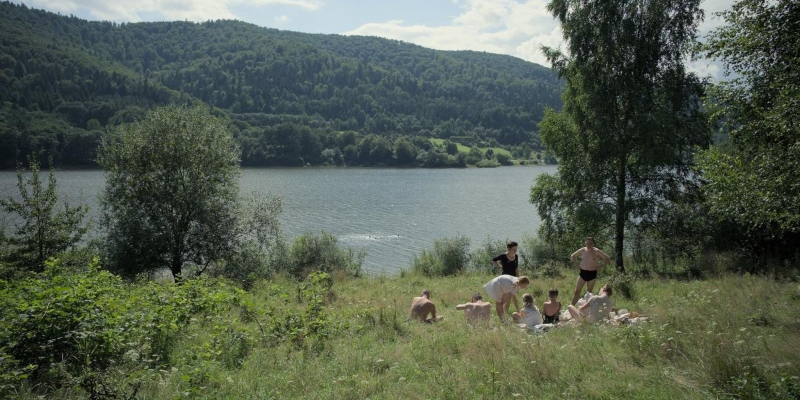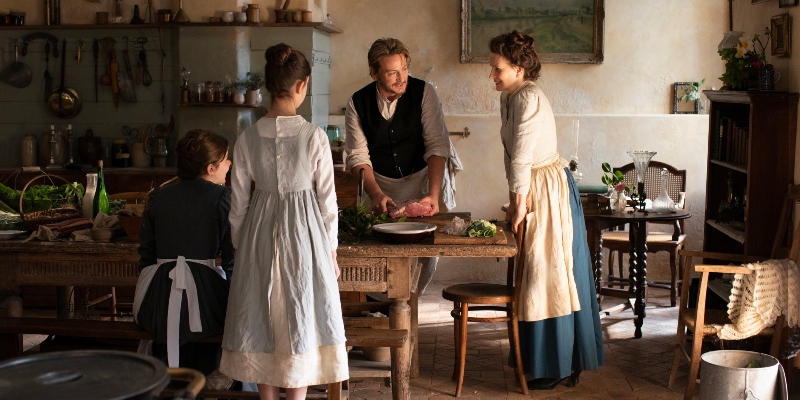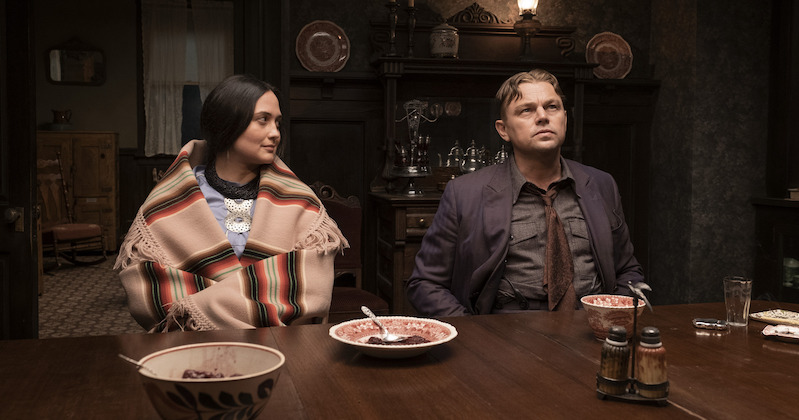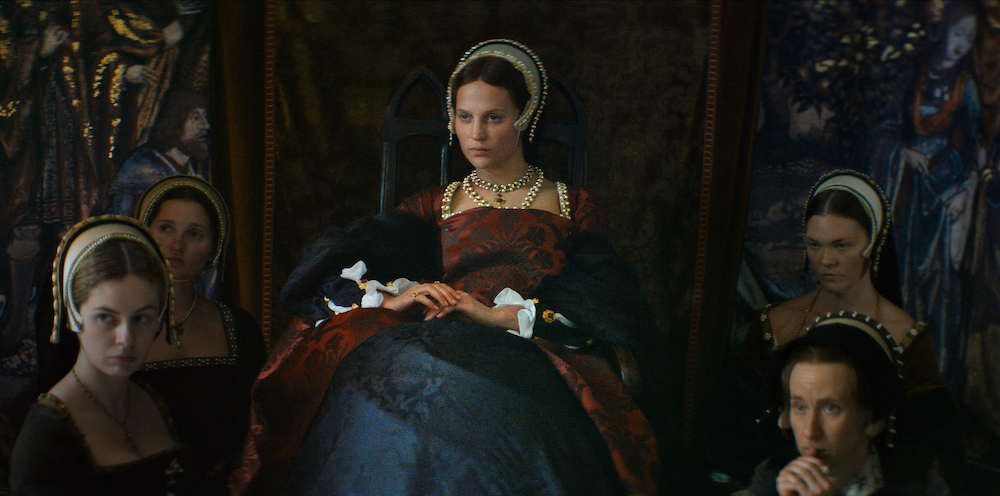Festival season has officially been kickstarted with the Cannes Film Festival, a glamorous 11-day event held in the South of France where thousands of celebrities, filmmakers, industry members, and cinephiles gather every May to celebrate the most anticipated titles of the year. Among the hundreds of films programmed across several sections, a handful are based on rich literary source material, both fiction and nonfiction.
With this year’s 76th edition of the festival officially wrapped, we gathered our thoughts on a selection of the book-to-film adaptations that made their debuts on the Croisette.

The Zone of Interest
Jonathan Glazer, the British director behind acclaimed films such as Under the Skin, Birth, and Sexy Beast has finally returned to cinema after a decade-long hiatus. His newest feature, The Zone of Interest, is nothing short of a masterpiece, with its early status as a success already being solidified after having been awarded the festival’s Grand Prix—the most significant prize after the Palme d’Or.
The film is a fully immersive experience into the domestic life of camp commandant Rudolf Höss (a real-life man, played here by Christian Friedel), his wife Hedwig (Sandra Hüller), and their family who live outside of Auschwitz. Loosely based on the 2014 novel of the same name by Martin Amis—who passed away the day after the film’s premiere—Glazer takes many liberties with the source material, using it more as a foundation for his vision as opposed to creating a straightforward translation to the screen. For instance, the romantic entanglement at the center of Amis’s book, namely the one between a Nazi officer and the wife of a camp commandant, doesn’t exist in Glazer’s version (nor does the point of view of a Jewish Sonderkommando), which largely remains plotless.
Glazer succeeds at making a Holocaust film that is completely unlike any we have seen before. The violence and brutality occuring within the camps that are often depicted on screen isn’t portrayed in the film, which uses the Höss family’s indifference to what happens beyond the walls of their idyllic home as a way to communicate the full scope of their evilness. We see them throw parties, have picnics, and spend time tending to their sprawling garden, while the outside horrors continue to loom. The one thing the film is able to vividly bring to life that the novel cannot is sound, an element that wholly transforms and elevates The Zone of Interest’s haunting atmosphere through Mica Levi’s eerie score and the sound of gunshots, people screaming, and the churn of the crematory ovens. The Zone of Interest is a triumph of filmmaking.

The Pot-Au-Feu
It’s often said that we eat with our eyes first, and Trần Anh Hùng’s return to the seaside festival 30 years after his debut, The Scent of Green Papaya, won the Camera d’Or, is the perfect encapsulation of this. Based on Marcel Rouff’s 1924 novel The Life and Passion of Dodin Bouffant, Gourmet, The Pot-Au-Feu emerged as an unexpected standout of this year’s festival—so much so that Anh Hùng took home the prize for Best Director. A mouthwatering feast for the eyes, the film is a sensual experience that delicately captures the ritualistic act of cooking through the characters of Dodin Bouffant (Benoît Magimel) and Eugenie (a sublime Juliette Binoche).
Dodin, who has been nicknamed “the Napoleon of culinary arts,” and his personal cook/collaborator of over 20 years have a relationship built on trust and a mutual respect for each other’s craft. He spends his days developing recipes, and she flawlessly executes them with the assistant of their maid Violette (Galatea Bellugi) and Violette’s young niece, Pauline (Bonnie Chagneau-Ravoire), who happens to have an elevated palate. Leisurely paced, the 2.5-hour film opens with a 40-minute sequence dedicated to the pair putting together an extravagant four-course meal for Dodin and a small group of his friends. Watching someone maneuver through a kitchen as they chop, stir, roast, braise, sear, strain, and bake food has never looked more mesmerizing. The photography of the food, shot by cinematographer Jonathan Ricquebourg, serves as the real heart of the film.
Although there is a romantic connection between Dodin and Eugenie, who constantly refuses his marriage proposals, the film refreshingly never veers into melodramatic territory. Even the cheesy dialogue and situations never come across as overly cringeworthy, which is a testament to Anh Hùng’s layered storytelling. Sometimes the greatest stories are those that seem the most basic, and in this case, The Pot-Au-Feu thrives in its simplicity.

Firebrand
For his first feature in the English language, Brazilian director Karim Aïnouz adapts Elizabeth Fremantle’s debut novel Queen’s Gambit, which tells the story of Catherine Parr, the sixth, final, and severely under-discussed wife of Henry VIII, whose previous wives were all beheaded. At first glance, the premise seems ripe for success in an era in which films like Spencer thrive, but Firebrand never manages to be the gripping historical drama it has the potential to be.
Set in 1543, the film stars Alicia Vikander as Catherine, who we first meet while assuming the role of regent in the king’s absence as he visits France during the war. While her husband, played by Jude Law, is away, she pays secret visits to her friend Anne Askew (The Crown’s Erin Doherty), a Protestant radical whose preaching against the king’s restrictive laws amounts to treason. When the cruel Henry returns earlier than anticipated with an injured leg oozing pus and gushing blood, he increasingly begins to question Catherine’s loyalty, which forces her to fight to avoid the same fate experienced by his previous wives.
Despite the rich material that could have been drawn from both Fremantle’s vibrant book and history itself, it appears as though with Firebrand, Aïnouz plays it safe. The film is anchored by Hélène Louvart’s lush visuals that perfectly capture the novel’s vivid and earthy descriptions and performances from the always amazing Vikander and Law, who fully leans into the king’s unhinged nature. Though Firebrand certainly makes for a fine costume drama, it never manages to stand out from the countless other works that already exist in the genre.

Black Flies
Of the 21 films that competed for the coveted Palme d’Or this year, there were none more bafflingly out of place than Black Flies, director Jean-Stéphane Sauvaire’s follow-up to 2017’s bleak, under-appreciated A Prayer Before Dawn. Here, Shannon Burke’s 2008 semi-fictional account of his experience as a paramedic in 1990s New York has been transformed into a painfully generic thriller starring Sean Penn and his Tree of Life co-star Tye Sheridan that feels like the type of flick to immediately get buried amongst a streaming service’s catalog.
Set in modern-day New York City, the film gives us a look at the lives of paramedics through the eyes of Ollie Cross (Sheridan), a rookie and aspiring doctor studying for the MCAT who gets partnered with Penn’s bitter Gene Rutokvsky. When we’re not accompanying them on gruesome emergency calls, we get brief glimpses into the two men’s personal troubles, like Rut visiting his daughter only to find out his ex-wife is planning on moving in with someone new or Ollie dealing with memories of his mother’s suicide. Unlike the book, where Rut suffered from PTSD as a result of the Vietnam War, his background in the film is being a firefighter on the scene during 9/11.
The film is at its most engrossing when we’re thrust in the midst of their frenzied jobs, but there comes a point where the constant depiction of people’s suffering, especially those from marginalized communities—for the sake of trying to make a big statement that doesn’t land—constitutes misery porn. Most crucially, Sauvaire and screenwriters Ryan King and Ben Mac Brown’s interpretation of the book lacks any of its subtleties. It attempts to be profound yet feels drained of any emotions that would allow the audience to truly connect with its characters, providing a surface level attempt at exploring the psychological impact of their work. Plus, the only woman who appears in several scenes is naked every time she’s on screen and yet we never learn her name. How are we supposed to take a film like that seriously?

Killers of the Flower Moon
One of the most anticipated movies to not only debut at Cannes but be released this year following several delays in 2022, Martin Scorsese’s big-budget western produced by Apple certainly lives up to the hype. An adaptation of David Grann’s acclaimed 2017 nonfiction book Killers of the Flower Moon: The Osage Murders and the Birth of the FBI, the film tells the devastating true story of the brutal murders of Osage Nation members in 1920s Oklahoma.
A slow exploration of greed, power, corruption, and betrayal sets a tragic love story between DiCaprio’s ex-infantry Ernest Burkhart and Lily Gladstone’s wealthy Native American Mollie Kyle against a series of murders at the hands of Ernest’s powerful uncle William “Bill” Hale (Robert De Niro). In true Scorsese fashion, the legendary filmmaker manages to sneak in elements and themes that appear throughout his past work, especially his gangster films, yet his approach to storytelling still feels refreshing.
While the sprawling ensemble includes the likes of legends including DiCaprio, De Niro, and Jesse Plemons, it’s Gladstone who emerges as the true star and beating heart of the film, delivering a subtle and moving performance of a woman watching every member of her family die as her diabetes worsen and the authorities do nothing to help. Much has been said about Scorsese’s thoughtfulness when developing and shooting his three-and-a-half-hour epic on location on the reservation, and he finds the perfect balance between the human connections developed throughout the film and the grim, tragic events that unfold.
